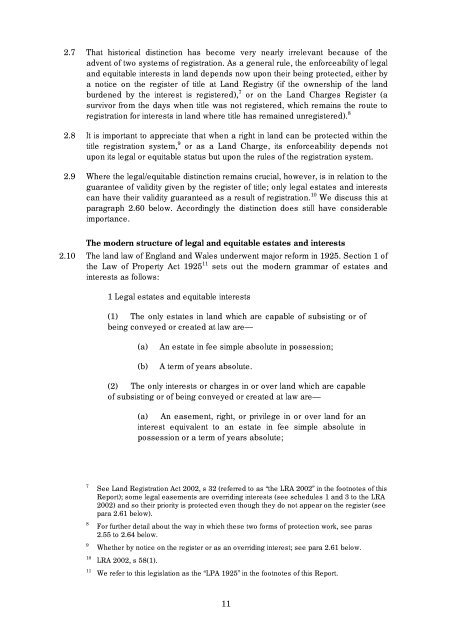Making Land Work: Easements, Covenants and ... - Law Commission
Making Land Work: Easements, Covenants and ... - Law Commission
Making Land Work: Easements, Covenants and ... - Law Commission
You also want an ePaper? Increase the reach of your titles
YUMPU automatically turns print PDFs into web optimized ePapers that Google loves.
2.7 That historical distinction has become very nearly irrelevant because of the<br />
advent of two systems of registration. As a general rule, the enforceability of legal<br />
<strong>and</strong> equitable interests in l<strong>and</strong> depends now upon their being protected, either by<br />
a notice on the register of title at <strong>L<strong>and</strong></strong> Registry (if the ownership of the l<strong>and</strong><br />
burdened by the interest is registered), 7 or on the <strong>L<strong>and</strong></strong> Charges Register (a<br />
survivor from the days when title was not registered, which remains the route to<br />
registration for interests in l<strong>and</strong> where title has remained unregistered). 8<br />
2.8 It is important to appreciate that when a right in l<strong>and</strong> can be protected within the<br />
title registration system, 9 or as a <strong>L<strong>and</strong></strong> Charge, its enforceability depends not<br />
upon its legal or equitable status but upon the rules of the registration system.<br />
2.9 Where the legal/equitable distinction remains crucial, however, is in relation to the<br />
guarantee of validity given by the register of title; only legal estates <strong>and</strong> interests<br />
can have their validity guaranteed as a result of registration. 10 We discuss this at<br />
paragraph 2.60 below. Accordingly the distinction does still have considerable<br />
importance.<br />
The modern structure of legal <strong>and</strong> equitable estates <strong>and</strong> interests<br />
2.10 The l<strong>and</strong> law of Engl<strong>and</strong> <strong>and</strong> Wales underwent major reform in 1925. Section 1 of<br />
the <strong>Law</strong> of Property Act 1925 11 sets out the modern grammar of estates <strong>and</strong><br />
interests as follows:<br />
1 Legal estates <strong>and</strong> equitable interests<br />
(1) The only estates in l<strong>and</strong> which are capable of subsisting or of<br />
being conveyed or created at law are—<br />
(a) An estate in fee simple absolute in possession;<br />
(b) A term of years absolute.<br />
(2) The only interests or charges in or over l<strong>and</strong> which are capable<br />
of subsisting or of being conveyed or created at law are—<br />
(a) An easement, right, or privilege in or over l<strong>and</strong> for an<br />
interest equivalent to an estate in fee simple absolute in<br />
possession or a term of years absolute;<br />
7 See <strong>L<strong>and</strong></strong> Registration Act 2002, s 32 (referred to as “the LRA 2002” in the footnotes of this<br />
Report); some legal easements are overriding interests (see schedules 1 <strong>and</strong> 3 to the LRA<br />
2002) <strong>and</strong> so their priority is protected even though they do not appear on the register (see<br />
para 2.61 below).<br />
8<br />
For further detail about the way in which these two forms of protection work, see paras<br />
2.55 to 2.64 below.<br />
9 Whether by notice on the register or as an overriding interest; see para 2.61 below.<br />
10 LRA 2002, s 58(1).<br />
11 We refer to this legislation as the “LPA 1925” in the footnotes of this Report.<br />
11
















